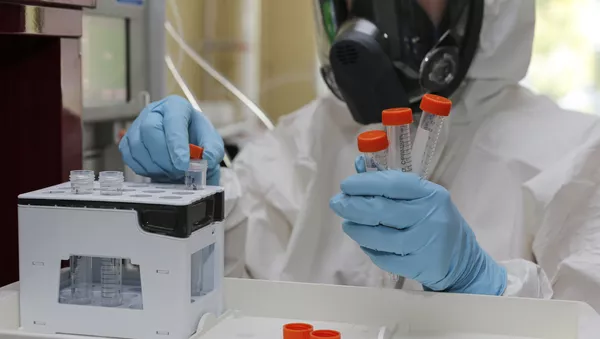While the World Health Organisation's recent announcement that the COVID-19 pandemic is stabilizing in Brazil offers some hope, the numbers of new confirmed cases and fatalities are still high. According to data from Johns Hopkins Coronavirus Resource Centre on Wednesday, the country has registered 3,669, 995 infections and 116,580 deaths with 1,271 coronavirus fatalities in just 24 hours on Tuesday.
Speaking to Medscape Medical News in late July, former Brazilian health officials bemoaned the lack of a centralised response to the pandemic and lack of consistency in terms of controlling the novel coronavirus as COVID policies and quarantine measures differ from region to region. According to the medical specialists, the virus has spread in poorly equipped rural areas, while several states are showing signs of a second wave.
Northeast Governors Take Matters Into Their Hands
"There is a great disparity between the federal government and the federal entities (states and municipalities)", says Gustavo Guerreiro, executive editor of the journal World Tensions and a member of the Brazilian Centre for Solidarity with Peoples and Struggle for Peace (CEBRAPAZ). "The [Bolsonaro] government operates in an uncoordinated way, limiting itself to military operations on indigenous lands and advertisement of hydroxychloroquine, a medication produced on a large scale by the Army, at the request of the Federal government. The drug's exaggerated stock is enough to be used for 18 years".
Addressing the lack of national coordination, nine governors in the country's northeast region created the Scientific Committee of the Northeast Consortium to Combat Coronavirus (C4NE), which officially kicked off in April.
Besides holding regular summits with scientists from Brazil and other countries such as Italy, China, and Germany, the committee launched a website with relevant information on the coronavirus situation in the region, scientific guidelines, documents and links to COVID monitoring mobile apps. "The information provided here is based on scientific articles", the site highlights. "You can submit your question and it will be answered and added to the frequently asked questions".
"The most effective fight is taking place by state governments, even without the coordination of the federal government's Ministry of Health", admits Guerreiro, stressing that C4NE's methods of fighting the pandemic have already brought visible positive results.
Brazil's northeast, the country's poorest and left-leaning region and home to Luiz Inácio Lula da Silva, a founding member of the Workers' Party (PT) and former president, had been highly skeptical about the Bolsonaro government's political course even before the pandemic. Therefore it is hardly surprising that the president's inconsistent handling of the COVID outbreak has prompted the region's governors to take action and tackle the threat on their own, according to the scholar.

Anti-COVID Vaccine to the Rescue
The country trails only behind the US in terms of COVID-related cases striving to get an efficient anti-coronavirus vaccine to curb the spread of the disease. To date, Brazil's health regulator, Anvisa, has approved the testing of four vaccines by Chinese pharmaceutical firm Sinovac Biotech in partnership with Butantan Institute; Oxford University in partnership with British-Swedish pharma firm AstraZeneca; US firm Pfizer in partnership with Germany's BioNTech; and US company Johnson & Johnson.
While Jair Bolsonaro is visibly leaning towards AstraZeneca's drug, São Paulo, a municipality in the Southeast Region of Brazil, has placed its bet on Sinovac Biotech's product. Though Russia's Sputnik V has yet to be approved by Anvisa, Parana state signed an agreement with the Russian Direct Investment Fund (RDIF) for testing, producing and distributing the Russian vaccine, which is the first one to be registered anywhere in the world.
But that is not all. Citing an announcement made by the governor of the state of Maranhão, Flávio Dino (the Communist Party of Brazil) on 14 August at a press conference, Guerreiro noted that Brazil's Northeastern states are considering an agreement with Russia to acquire Sputnik V. As Dino specified during the presser, the protocol is still at an early stage.
However, the scholar voiced concerns that the Brazilian president may throw sand into local governments' gears given his pro-US stance.
"With the Bolsonaro government, Brazil follows a foreign policy agenda completely submissive to Washington", Guerreiro says. "The mainstream media also reproduce this agenda". After the release of the Russian anti-COVID drug, it was subjected to a storm of criticism from Western politicians and media pundits.
Meanwhile, Brazilian Ambassador to Russia Tovar da Silva Nune emphasised on Monday that the Russian anti-coronavirus vaccine can boost bilateral cooperation and lead to rapprochement between the two countries while speaking to Sputnik on the sidelines of the Army 2020 defense industry forum. According to Nune, Sputnik V has generated interest at both the federal and the state levels in Brazil. Once approved by Anvisa, the Russian vaccine can help the country to tackle the pandemic threat, according to Nune.
"We know the Russian technological capacity", he said. "We know what the Russians are capable of. The states which are most interested are Bahia and Parana. Our Ministry of Health is also interested and collects the information."




